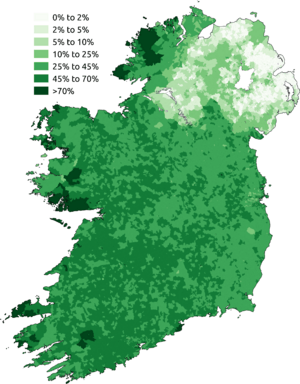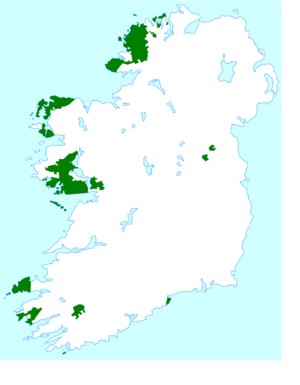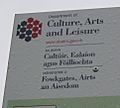Irish language facts for kids
Quick facts for kids Irish |
||||
|---|---|---|---|---|
| Irish Gaelic Gaeilge |
||||

"Gaelach" in traditional Gaelic type
|
||||
| Native to | Ireland | |||
| Region | Ireland, mainly Gaeltacht regions | |||
| Native speakers | 73,804 in Ireland (2016) 4,166 in Northern Ireland L2 speakers: 1,761,420 in the Republic of Ireland (2016), 104,943 in Northern Ireland (2011) |
|||
| Language family | ||||
| Early forms: |
Primitive Irish
|
|||
| Standard forms | An Caighdeán Oifigiúil | |||
| Writing system | Latin (Irish alphabet) Irish Braille |
|||
| Official status | ||||
| Official language in | ||||
| Recognised minority language in | ||||
| Regulated by | Foras na Gaeilge | |||
| Linguasphere | 50-AAA | |||

Proportion of respondents who said they could speak Irish in the Republic of Ireland and Northern Ireland censuses of 2011.
|
||||
|
||||
Irish, also known as Irish Gaelic or Gaeilge, is a language spoken in Ireland. It is a Celtic language. This means Irish is related to languages like Scottish Gaelic, Breton, Cornish, Manx, and Welsh.
Celtic languages are divided into two main groups. Irish and Scottish Gaelic belong to one group, while Welsh is in another. This is why people who speak Irish can often understand some Scottish Gaelic, but not Welsh. An interesting fact about Irish is that it does not have simple "yes" or "no" words.
For a long time, Irish was the main language of poets and storytellers. They wrote amazing poems and told tales about heroes from ancient times. Many of these poems later became popular songs.
Contents
A Brief History of Irish
For many centuries, most people in Ireland spoke Irish. However, things began to change in the 1800s. After 1801, Ireland became part of the United Kingdom. Schools in Ireland then started teaching mostly in English.
Even the Roman Catholic Church and some Irish leaders, like Daniel O'Connell, began to suggest that English was more useful. They felt that knowing English would help people find jobs in places like the United States or the British Empire.
Irish Today
Today, Irish is the first official language of the Republic of Ireland. However, English is still used more often in daily life and in the government. Many people in Ireland learn Irish in school, and some speak it with friends and family.
There are special areas in Ireland called Gaeltacht areas, or Gaeltachtaí in Irish. In these places, a large number of people speak Irish every day. About 70% of the people in these areas use Irish regularly.
A newer Gaeltacht area has grown on the Falls Road in Belfast City. Here, the community is working to make Irish their main language. This area is known as the Gaeltacht Quarter.
Common Irish Words and Phrases
Learning a few words in Irish can be fun! Here are some common words and phrases:
- aon = one (pronounced: a-n)
- dó = two (pronounced: doe)
- trí = three (pronounced: tree)
- ceathair = four (pronounced: cah-her)
- cúig = five (pronounced: coo-igg)
- sé = six (pronounced: shay)
- seacht = seven (pronounced: shocked)
- ocht = eight (pronounced: uk-ed)
- naoi = nine (pronounced: knee)
- deich = ten (pronounced: de)
- céad = one hundred
- dhá chéad = two hundred
- Dia Dhuit = Hello (meaning "God be with you")
- Céad Mile Fáilte = One hundred thousand welcomes
- Ceist ag éinne? = Anyone have a question?
- Éire = Ireland
- go maith = good
- Slán = goodbye
- Leabhar = book
- Madra = dog
Images for kids
-
A bilingual sign in Grafton Street, Dublin.
-
Bilingual road signs in Creggs, County Galway.
-
A sign for the Department of Culture, Arts and Leisure in Northern Ireland, in English, Irish, and Ulster Scots.
See also
 In Spanish: Idioma irlandés para niños
In Spanish: Idioma irlandés para niños








